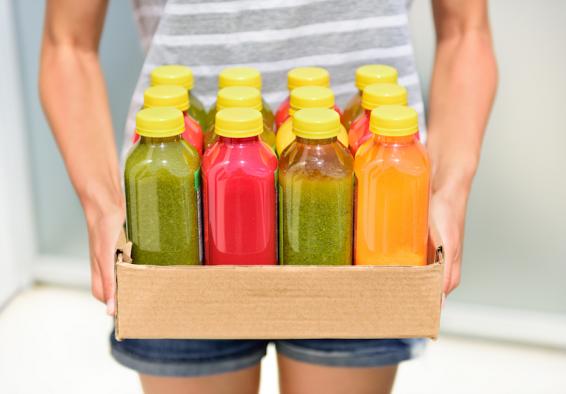Cleanses or detoxification (detox) diets might be a tempting way to jump-start your fitness goals, lose last-minute pounds before your weigh-in, or “reset” your body after holiday or vacation eating, but do they work? And are they safe? While some are likely safe, others could be quite dangerous to your health.
If you’re healthy, there’s no real need for a cleanse or detox diet since your body is supposed to detoxify itself.
What is a cleanse or detox diet?
A cleanse or detox diet is promoted to rid the body of “toxins” and might consist of specific foods or an eating plan, teas or juices, dietary supplements (pills, powders, capsules), enemas, laxatives, or combinations of these. It can also involve fasting. Cleanse or detox programs might be recommended for a few days to a few weeks.
Are cleanses safe?
A few days of a food- or drink-based cleanse or detox is likely safe for most healthy people. Many cleanses involve eating larger quantities of fruits and vegetables and eliminating processed foods—actions that generally improve health. As well, many cleanses involve fasting or restricted food intake. The practice has been occurring for thousands of years as part of world religions (for example, Ramadan fasting in Islam and Lenten fasting in Christianity). Religious fasting is generally safe for healthy, non-elderly individuals.
However, some products and some circumstances aren’t safe for undergoing cleanses or detox diets. Even food- and drink-based cleanse programs have potential risks to your health and performance. For instance, some are dangerously low in calories. Low energy intake can cause fatigue, weakness, headaches, or nausea as well. This can impact your ability to perform even light activities such as walking or standing for periods of time. Some of these diets lack certain vitamins, minerals, and other nutrients (such as protein or healthy fats) that can also affect your performance.
Military Service Members should use additional caution or avoid cleanses that involve these types of products or risky scenarios:
Laxatives or enemas can cause dehydration and electrolyte imbalances, which can exaggerate symptoms of fatigue, weakness, headaches, and/or nausea.
Dietary supplements (pills, powders, capsules, etc.)
Intense or new trainings and missions
Deployment
History of eating disorder(s) or disordered eating, which a cleanse could retrigger
Are cleanses effective for weight loss?
You might experience short-term weight loss on a cleanse due to the reduced or low-calorie eating plan and possible loss of “water weight” (dehydration). However, it’s unclear whether this might lead to long-term weight loss. And once the cleanse period is over, you could regain the weight you had lost. In fact, limited research supports cleanses or detox diets for effective weight loss.
Some people find it very motivating to begin with a 3-day, low-calorie diet. If you go that route, make sure to shift to a sustainable, healthy weight-loss plan. Always be cautious if considering any dietary supplements, laxatives, or enemas—no matter how long you take them.
Are cleanses effective for detoxifying?
Some people turn to cleanses or detox diets for reasons other than weight loss, such as eliminating toxins. Your body detoxifies itself (without outside assistance) by getting rid of wastes through urine, feces, and sweat. Your liver, kidney, lymphatic system, and gastrointestinal system are all essential to detoxification.
Even so, research is evolving. Some integrative medicines, such as functional and Ayurvedic medicines, prescribe treatments to help the body detoxify more effectively, particularly for certain medical conditions. To pursue these detox treatments, it’s important to work with a skilled, licensed medical provider. Stay tuned for more research on this evolving field.
What can you do instead of a cleanse or detox?
You’ll feel better and perform better when you make some lasting changes to your eating habits, rather than a quick fix. Always choose whole foods first and follow a balanced, nutrient-dense eating plan to optimize performance. Try these tips to “clean up” your eating habits.
- Stay hydrated. Drink water throughout the day and especially before, during, and after exercise.
- Eat more fiber. Include fruits, vegetables, whole grains, beans, lentils, nuts, and seeds in your eating plan.
- Limit “junk.” Choose whole foods that are less processed and closer to their natural state.
- Shrink your sugar intake. Cut down on foods and drinks with added sugar such as sodas, juice drinks, candies, and sweets.
A crucial first step is to consult your healthcare provider before starting any cleanse or detox plan, especially if you have a medical condition. Meanwhile, visit the OPSS website to learn more about cleanse and detox dietary supplement products.
